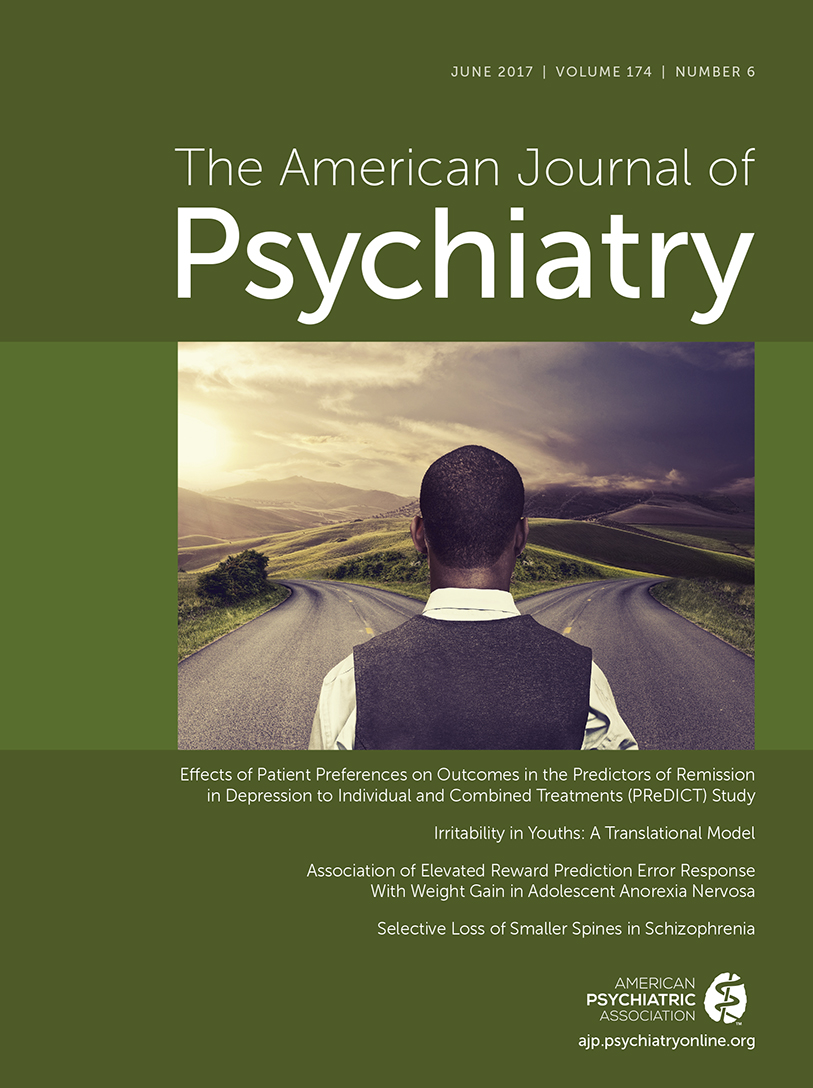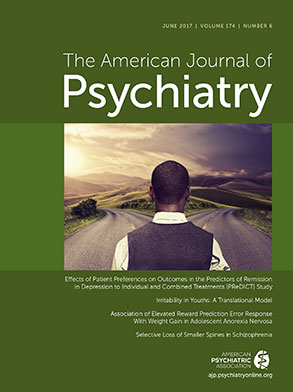Anorexia nervosa is a complex and enigmatic psychiatric disorder characterized by persistent self-starvation in spite of significantly low weight. Phenotype characteristics include asceticism, risk aversion, sensitivity to punishment, anxiety, and cognitive and behavioral rigidity. While anorexia nervosa has been recognized since the 19th century, only in the past two decades have investigators come to recognize it as a brain disorder. Given the clinical profile of perseverative self-denial of food, neurobiological inquiry into the etiology and maintenance of anorexia nervosa has focused on circuitry involved in reward processing and cognitive control.
In this issue, DeGuzman and colleagues (
1) examine differences in neural activation associated with reward learning in adolescents with anorexia nervosa before and after weight restoration, compared with healthy control adolescents measured at two time points. The paradigm involved first learning to connect stimuli (shapes) to receiving a monetary reward or not (conditioning phase). In the second phase of the experiment, the same stimuli were presented, providing either accurate predictions (where the stimulus is paired with the expected reward or lack of reward) or prediction errors (where an expected reward is not provided or an unexpected reward is received). DeGuzman et al. focused on neural activation in response to reward prediction errors, that is, how individuals with anorexia nervosa compared with healthy control subjects responded when they expected a reward and did not get it, and when they were not expecting a reward but received one. They found that the anorexia nervosa group had greater striatal and insula activation in response to reward prediction errors than did the control group. Analyzing the two types of prediction errors separately, the investigators found that greater brain activation in response to unexpected reward receipt was evident in the anorexia nervosa group in both the acutely ill and the weight-restored states, while elevated brain responses to unexpected reward omission abated with weight restoration. Furthermore, in the anorexia nervosa group, greater activation in the caudate to a reward prediction error prior to treatment was associated with less weight gain during treatment.
As a construct, prediction error captures how the cognitive system responds to deviations from expectation. DeGuzman and colleagues’ data demonstrate that when adolescents with anorexia nervosa are faced with an error regarding their prediction of outcomes (in particular, receipt of rewards), their brains responded more strongly compared with those of healthy control subjects. Given that individuals with anorexia nervosa are prototypically rigid and gravitate toward predictable routine—for example, following strict self-imposed dietary or exercise rules, eating the same foods in the same order at the same times of day (
2)—it follows that they would be highly sensitive to any form of deviation. The strong drive toward sameness/rigidity in the individual with anorexia nervosa may contextualize the salience of these violations.
Yet, the meaning and consequences of this salience are curious. It has been shown that midbrain dopamine neurons respond to prediction errors for reward, providing a signal for altering behavior toward obtaining maximum rewards (
3). The DeGuzman et al. data demonstrate that when adolescents with anorexia nervosa receive an unexpected reward, they have increased insula activation, and that a difference in insula activation to unexpected reward persists with weight restoration. It would be helpful to have self-report or behavioral data to aid interpretation of this finding: Is the unexpected reward received pleasurable, or aversive because it is off-plan? As there has been the suggestion that dopamine release (associated with insula activation) may be perceived as anxiogenic in anorexia nervosa (
4), it is possible that the unexpected reward is perceived as a negative rather than a positive experience. If it is received as positive, it may promote approach, whereas if it is experienced as aversive, it may encourage the individual to redouble efforts to stick to routine.
Generally, the neural response to reward prediction gives important information about whether one’s assumptions of the world hold true (or need to be reconsidered), driving learning and potentially signaling the need for a change in behavior. As these brain areas signal the cognitive control network to help regulate behavior, it follows that this should promote faster revision of acquired rules about the world (reinforcement learning) as well as flexible adaptation of behavior (reward-based action selection) (
5,
6). Presumably, the more salient the experience of a reward prediction error, the greater the likelihood of subsequent change. For individuals with anorexia nervosa, these violations are strongly perceived; according to DeGuzman and colleagues’ findings, adolescents with anorexia nervosa should be masters of adaptive change. But the literature on anorexia nervosa consistently suggests strong resistance to behavior change, with data demonstrating that they have difficulty changing rules and adopting novel behaviors (
7–
9).
In the DeGuzman et al. study, the focus was not on whether increased activation to reward prediction error promoted learning or behavioral change. While the literature on reinforcement learning generally suggests that it does, whether this bears out in the anorexia nervosa population warrants testing, particularly given the often intractable nature of eating disorder behaviors, which have been theorized to develop as a result of operant conditioning but then persist as a result of habit, even when reinforcements cease (
2). If the tested paradigm, which activates in response to reward prediction error, were to be useful in promoting cognitive or behavioral learning and change in anorexia nervosa, this would have important treatment implications. However, the finding that the strongest caudate activation to prediction error was associated with the poorest weight gain during treatment suggests that this signal may function differently in anorexia nervosa.
DeGuzman et al. build on their team’s previous work documenting altered reward processing and enhanced activation in response to prediction error for food stimuli in adult women with anorexia nervosa with active low weight and women in a weight-restored state (
10,
11). Clear strengths of the study include its focus on an adolescent sample with anorexia nervosa, studied in proximity to illness onset and scanned both before and after weight restoration. Testing of a novel nonfood reward learning paradigm further allows for inference about neural processing abnormalities in adolescents with anorexia nervosa that are general rather than specific to food. The study’s limitations can serve to incite future studies. First, the sample was largely of adolescents with restricting-type anorexia nervosa, and thus we cannot generalize to those with binge/purge-type illness, who may be expected to differ in some key ways with regard to reward learning and cognitive control. Second, inclusion of self-report or behavioral measures of subjective experience (pleasure, anxiety) to expectations being met or violated may be key to illuminating the present findings. Finally, measuring translation of increased activation in response to prediction error to cognitive and behavioral learning and behavior change is a clear next step in this line of research.
DeGuzman and colleagues’ work is an important piece of the puzzle, and it underscores the paradox that is anorexia nervosa: Neural response to deviation is strong, signaling the call for change, but clinically, the most ingrained cognitions and behaviors persist.

